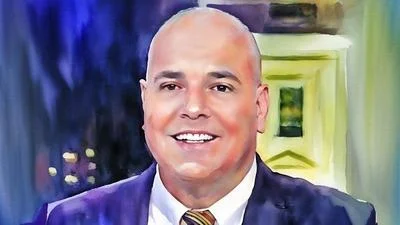Michael Quinn Sullivan is publisher of Texas Scorecard and host of the Texas Minute podcast. He produced “Red Power,” a documentary on China’s involvement in the US energy sector.
This transcript has been edited for length and clarity.
Federal Newswire: What brought you to report on China’s involvement with Texas energy?
Sullivan: It started out rather practically a couple of years ago. Many folks know in Texas, we had this crazy winter storm that brought us to within about 4.5 minutes of the Texas power grid shutting down. Up until that moment, my only real thought of the power grid was my monthly electric bill.
But then, earlier this year, [legislators were] having this discussion about problems with the power grid and unreliable energy sources…, which then led to the realization that green energy isn't about green energy. Green energy is actually about funneling cash to China.
China has taken advantage of our cultural shift [in the] United States to push for renewed global power. They've taken advantage of it and used it to their benefit. That's when we realized there's a story to tell here.
Federal Newswire: Is it happening elsewhere in the country?
Sullivan: Yes. If I [have] any regrets with our documentary it’s that, since I'm a Texan, I view the United States map as Texas and not-Texas. What we recognized was, this is a national story.
Texas is the eighth largest economy on the planet. [If] something happened to the Texas economy, you people are in trouble, too. The policies being implemented in Texas are mirrored on the eastern grid.
...Basically from Oklahoma to the east and the western grid, the same kind of policies [exist]. Those policies have been driven by the Biden administration, and by the Bush administration and the Obama administration, and even the Trump administration. A lot of these policies push green energy, some of it possibly well-intended, some of it possibly not well-intended.
Federal Newswire: How did China get involved?
Sullivan: We want renewable energy, green energy, solar and wind. Now, remember, solar and wind are not actually very environmentally friendly.
We wouldn't do the kinds of things to our land that you have to do in order to mine and prepare solar panels and windmills. [China is] one place on the planet that's more than happy to do that. They don't have much in the way of oil and natural gas. They have a little bit of coal. China...may be evil, but the Chinese Communist Party is not stupid.
China recognizes this confluence of events where Americans were eager to take on unreliable energy sources. China was willing to step up and provide them, [causing] the ecological damage and doing the kind of the humanitarian damage [and] the physical toll it takes to do this kind of work. China was willing to provide it. China has now in some ways become an energy exporter, because they export all these...windmill parts and solar panels to the United States, a complete reversal of where they were, call it 15 years ago.
Federal Newswire: Is this just an attempt to shift wealth and technology, or something else?
Sullivan: I think there are several ways that you see this dependency playing out to our detriment and to China's benefit. The first is the unreliability of our own electric grid. I'm talking mainly about Texas, but I'm also talking about California, and New York, and the rest of the states. They all have the same problem: an inherently unreliable electric grid.
Texas put it on steroids–30% to 50% of our daily power grid is coming from wind and solar. When the sun sets, the solar panels stop working. The wind only blows at the speeds necessary for a windmill to generate electricity about 25% of the time.
When you're putting somewhere between a quarter and half of your power grid into unreliable energy production, you're going to have problems economically. You're not going to be powering the physical plants, the data centers, all the things you need to be powering. Making our economy weaker is a benefit to China.
Federal Newswire: What are some examples of where China is benefiting at our expense?
Sullivan: Chip Roy, a U.S. Congressman from Texas, walked through the amount of money just from federal subsidies that is making its way to China because of solar and wind energy policies. Billions of dollars [are] flowing into Beijing's coffers that would not have otherwise.
Probably the most troubling, is...technologies like over the horizon mapping. Putting various sensors on top of these 600-700 ft. tall windmills means that the Chinese have unprecedented insight into our most sensitive military installations.
We see that in Texas. We see it in North Dakota. We're seeing it around the nation. China and its affiliates are purchasing large swaths of unusable property, and then sticking windmills on top of them. It tells you it's not about energy production. It's about spying.
Federal Newswire: What other advantages does this provide to China?
Sullivan: The technology required to convert sunlight to electricity is very computationally intensive. Every solar panel is a computer chip. Definitionally, these computer chips are now connected to our power grid, and power grids can also be used to transmit electronic commands.
We do not yet have evidence, but there is strong suspicion from those in the national security community that China, which is producing the chips that are going into those solar panels, could be programming kill switches. It doesn't take a hailstorm to destroy a solar panel. [You can] turn off solar panels in a computer somewhere, and that puts our economy [in a] much more fragile state.
Federal Newswire: How do you assess the environmental footprint of windmill and solar farms?
Sullivan: [Wind and solar are] sold as being environmentally friendly. But in fact, they take up far, far greater swaths of land than a natural gas-fired power plant or a nuclear power plant, particularly when you consider the mining and all those sorts of things.
What is not often discussed in terms of land usage and cost of these things is the end of life. [When] the hailstorm comes through, generally speaking, the solar companies are leaving those destroyed, ruined, cracked, leaking, damaged solar panels in place...We don't have any studies on what's the long term impact on agricultural uses in the future.
In the same way, when the windmills crash down they stop working. All mechanical devices have an end-life, [and] you can't recycle them. They are taking these huge pieces of windmills and creating windmill graveyards around the country. These things just sit there and eventually start decaying and leaching chemicals into the ground without any real accountability or oversight.
Federal Newswire: Are legislatures considering all these issues?
Sullivan: Yes. [You] can only get people to go along with [wind and solar if there is] complete subsidization–federal, state and local subsidies. No human being would spend their own money investing in wind farms and solar fields. They're not efficient or effective as a way to make money. The only way they work is through subsidies.
Trying to get Congress to tie its own shoe is sometimes an impossible task, so undoing those subsidies at the federal level is a Herculean task for the state legislature. We're seeing some success in the Texas legislature fixing that, but the place that they are most sensitive is at the local level. School districts and cities and counties in the various states...are doing subsidies also.
By citizens putting a little bit of pressure on their school boards, city councils, and county governance structures, they are able in many cases to stop these windmill farms and the solar fields from going into place. There is hope for citizens to take action, but it does require action.
Federal Newswire: Where can people go to follow more of your work?
Sullivan: You should visit our website, TexasScorecard.com, where you can find the documentary “Red Power.” Also follow us on all the various social media channels. You'll find our daily work covering what's happening in state and local government. You can also keep track of some of these documentaries we've done trying to help citizens understand the connection between their activity and the kind of results we are not getting out of our government.









